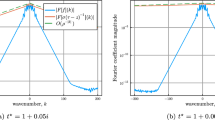Abstract
In this paper we consider a Chebyshev polynomial method for the calculation of line integrals along curves with Cauchy principal value or Hadamard finite part singularities. The major point we address is how to reconstruct the value of the integral when the parametrization of the curve is unknown and only empirical data are available at some discrete set of nodes.
We replace the curve by a near‐minimax parametric polynomial approximation, and express the integrand by means of a sum of Chebyshev polynomials. We make use of a mapping property of the Hadamard finite part operator to calculate the value of the integral.
Similar content being viewed by others
References
K.E. Atkinson, Introduction to Numerical Analysis, 2nd edition (Wiley, New York, 1989).
K.E. Atkinson and E. Venturino, Numerical evaluation of line integrals, SIAM J. Numer. Anal. 30 (1993) 882-888.
C. Barone and E. Venturino, On the numerical evaluation of Cauchy transforms, Numer. Algorithms 5 (1993) 429-436.
D. Chien, Piecewise polynomial collocation for integral equations on surfaces in three dimensions, Ph.D. thesis, University of Iowa, Iowa City (1991).
M.A. Golberg, The convergence of several algorithms for solving integral equations with finite-part integrals, J. Integral Equations 5 (1983) 329-340.
J.D. Lawrence, A Catalog of Special Plane Curves (Dover, New York, 1972).
J. Lyness, The calculation of Stieltjes' integral, Numer. Math. 12 (1968) 252-265.
P.A. Martin, End-point behaviour of solutions to hypersingular integral equations, Proc. Roy Soc. London Ser. A 432 (1991) 301-320.
P.A. Martin, Exact solution of a simple hypersingular integral equation, J. Integral Equations Appl. 4 (1992) 197-204.
P.A. Martin and F.J. Rizzo, Hypersingular integrals: how smooth must the density be?, Internat. J. Numer. Methods Engrg. 39 (1996) 687-704.
J.C. Mason, Chebyshev polynomials of the second, third and fourth kinds in approximation, indefinite integration, and integral transforms, J. Comput. Appl. Math. 49 (1993) 169-178.
J.C. Mason and G.H. Elliott, Constrained near-minimax approximation by weighted expansion and interpolation using Chebyshev polynomials of the second, third and fourth kinds, Numer. Algorithms 9 (1995) 39-54.
T. Rivlin, An Introduction to the Approximation of Functions (Dover, New York, 1981).
E. Venturino, Effective computation of operators defined by line integrals with endpoint singularities, in: Recent Developments in Operator Theory and Its Applications, eds. I. Gohberg, P. Lancaster and P.N. Shivakumar, Operator Theory, Vol. 87 (Birkhäuser, Basel, 1996) pp. 419-435.
Author information
Authors and Affiliations
Rights and permissions
About this article
Cite this article
Mason, J., Venturino, E. A Chebyshev polynomial method for line integrals with singularities. Advances in Computational Mathematics 10, 187–208 (1999). https://doi.org/10.1023/A:1018978615805
Issue Date:
DOI: https://doi.org/10.1023/A:1018978615805




